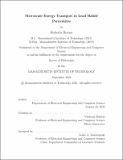Microscale Energy Transport in Lead Halide Perovskites
Author(s)
Brenes, Roberto
DownloadThesis PDF (63.34Mb)
Advisor
Bulović, Vladimir
Terms of use
Metadata
Show full item recordAbstract
Energy transport is of paramount importance for the operation and design of semiconductor devices. Lead halide perovskites, an emerging semiconductor for optoelectronic applications, exhibits significant phenomena that can enhance or disrupt lateral energy transport, such as photon recycling and microscale heterogeneity. Understanding and quantifying these energy transport mechanisms is critical for scaling perovskite photovoltaic device areas. In this thesis, we explore how photon recycling affects energy transport both in the macro and microscale, and develop a framework to quantify carrier diffusion anisotropy and grain boundary effects in optical microscopy measurements. First, we quantify the enhancement due to photon recycling in the macroscale for state-of-the-art perovskite films. We find that even with finite nonradiative recombination, benefits from photon recycling can be achieved when nonradiative lifetimes and light-emitting diode (LED) electroluminescence efficiencies exceed 2 μs and 10%, respectively. Next, we demonstrate that processes such as nonlinear recombination and photon recycling can have a significant impact on measured mean-squared-displacement (MSD) profiles in the microscale, especially for excitonic materials with short radiative lifetimes. Additionally, we find that film microstructure can lead to unique transport profiles that strongly depend on the material boundary behavior and the differences between the domain feature size and the energy carrier diffusion length. Finally, we develop a framework to analyze experimental energy carrier diffusion maps accounting for the diffusion tensor and material microstructure to overcome the shortcomings of MSD models. We use this framework to study anisotropy in lead halide perovskite single crystals and polycrystalline thinfilms. By globally fitting the unnormalized data over the diffusion map, we quantify both carrier transport and recombination and, importantly, reveal anisotropy in the diffusion tensor for CH₃NH₃PbI₃ polycrystalline films. This framework paves the way for understanding anisotropic energy transport in heterogeneous materials.
Date issued
2022-09Department
Massachusetts Institute of Technology. Department of Electrical Engineering and Computer SciencePublisher
Massachusetts Institute of Technology